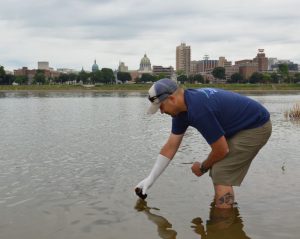
Decision Allows Lower Susquehanna Riverkeeper to Intervene in Long-Stalled Legal Action filed by EPA and Pennsylvania over Harrisburg Sewage Violations
Harrisburg, Pa – A U.S. District Court Judge criticized the years of delays in efforts by Pennsylvania and EPA to stop chronic sewage overflows in the state capital and granted a motion by the Lower Susquehanna Riverkeeper to intervene in the case.
The decision by Judge Christopher C. Conner of the Middle District of Pennsylvania on Friday allows the clean water advocacy group, represented by the Environmental Integrity Project (EIP), to participate in negotiations over how to resolve a 2015 lawsuit filed by EPA and Pennsylvania Department of Environmental Protection (DEP) over hundreds of millions of gallons of sewage and stormwater released every year into the Susquehanna River.
That 2015 lawsuit resulted in an agreement, called a partial consent decree, that required Harrisburg Capital Region Water to come up with an acceptable long-term plan by 2018 to stop the sewage overflows. But almost four years later, the judge wrote, that cleanup plan is still not in place.
“The partial consent decree contemplates an approvable long-term control plan having been submitted by April 1, 2018,” Judge Connor wrote in a decision released on Friday. “Approaching four years later, Capital Region Water has been unable to meet this deliverable, and the existing parties now inform the court that Capital Region Water will be unable do so until after it conducts necessary repair work. Such substantial delays were not contemplated by the court.”
The judge ruled that the extended delays are a good reason to grant a motion filed by the Lower Susquehanna Riverkeeper and EIP on May 6, 2021, to have the environmental groups intervene in the six-year-old federal and state sewage lawsuit against Harrisburg. The groups argued that an intervention was necessary because DEP and EPA had so far has failed to produce any real progress in halting overflows that average about 800 million gallons a year.
“This is good news, because it shows the courts recognize that government was moving too slowly to fix a serious public health problem and that the status quo is simply unacceptable,” said Ted Evgeniadis, the Lower Susquehanna Riverkeeper. “We will now have a seat at the table in discussions to demand an end to this sewage nightmare and protect the great Susquehanna River.”
Lisa Hallowell, Attorney for the Environmental Integrity Project, said: “We appreciate Judge Connor’s thoughtfulness and consideration of the facts in this case. It’s simply not acceptable for government to drag its feet while Pennsylvania’s state capital continues to pipe millions of gallons of sewage into the Chesapeake Bay’s biggest tributary.”
For more than a century, Harrisburg has had a combined sewage and stormwater system that is designed to overflow into the river from 59 outfalls whenever it rains. EPA and DEP sued Harrisburg Capital Region Water over water pollution violations from the antiquated system in 2015.
That lawsuit – still pending in court – was supposed to produce a long-term plan and a final consent decree that would halt the sewage violations. But more than six years later, the Governor’s Mansion and State Office Complex, among other buildings in the Harrisburg area, are still piping raw sewage into the river about once a week under a weak and temporary “partial consent decree” that sets no deadline for closing the sewage outfalls or fixing the problem.
Harrisburg Capital Region Water reported releasing 902 million gallons of sewage mixed with stormwater into the Susquehanna River in 2019, 1.4 billion gallons in 2018, 899 million gallons in 2017, and 789 million gallons in 2016.
The Lower Susquehanna Riverkeeper sampled for fecal bacteria along Harrisburg’s waterfront from June 1 to July 30 of 2021 and found that 52 percent of water samples had levels of E. coli bacteria that would make the water unsafe for swimming, kayaking, or other water contact recreation, including just downstream from the outfall leading from the State Capitol Complex and Governor’s Residence and at City Island Park Beach.
Those findings in the summer of 2021 were worse than the 33 percent of samples unsafe for swimming in the summer of 2020 along the Harrisburg waterfront, or the 48 percent of samples in 2019, according to the monitoring by the Lower Susquehanna Riverkeeper.
For a copy of the judge’s decision, click here.
The Lower Susquehanna Riverkeeper Association is a non-profit watershed association dedicated to improving the ecological health of the Lower Susquehanna River Watershed and the Chesapeake Bay. The Lower Susquehanna Riverkeeper patrols the river for illegal pollution, and when necessary, enforces environmental laws to protect the river and communities that depend on it
The Environmental Integrity Project is a 19-year-old nonprofit organization, based in Washington, D.C., that is dedicated to strengthening public policy and enforcing environmental laws to protect public health.
Media contacts: Ted Evgeniadis, Lower Susquehanna Riverkeeper, (609) 571-5278 or lowsusriver@hotmail.com
Tom Pelton, Environmental Integrity Project, (443) 510-2574 or tpelton@environmentalintegrity.org


